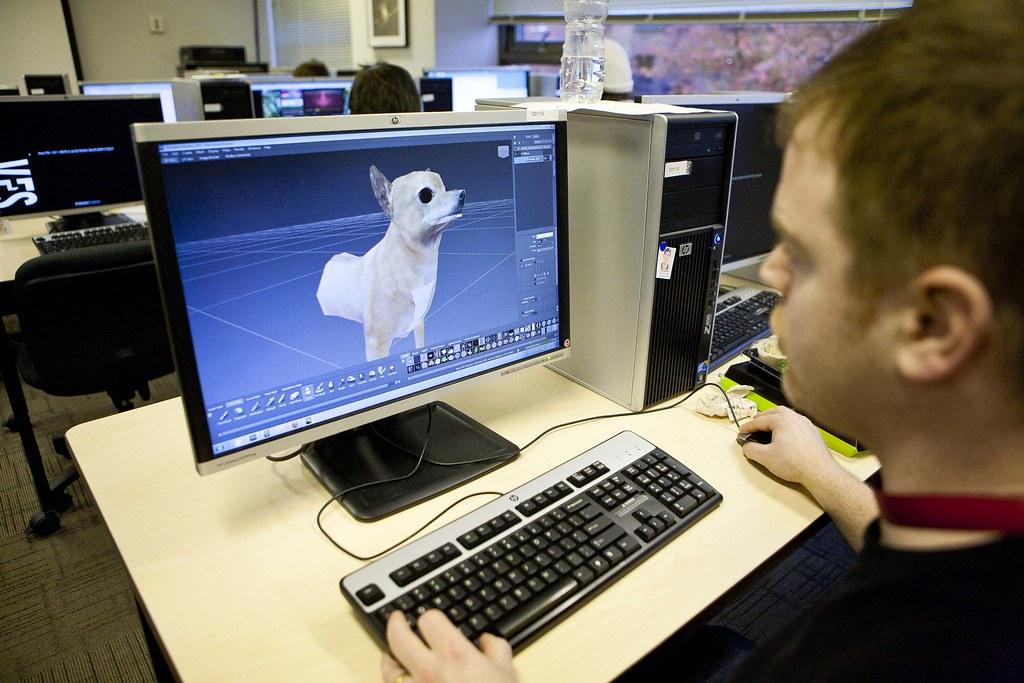The games you play or see every day are products built by game developers. They give you unforgettable experiences with coding and graphic skills.
Game development is a highly competitive field. However, you may want to follow this career path for many objective reasons.
In this article, we will discuss how to become a game developer. You can also learn about this job, such as daily tasks, salary, and demand.
Let’s read on to discover!
What Is A Game Developer?
Game developers perform game development tasks, such as user interface, visuals, logic, and artificial intelligence.
You’ll most likely work as a first, second, and third-party worker in this sector or as an independent worker.
Whatever path you take depends on where you are in the business, whatever aspects of content creation you are passionate about, and how much control you desire over the finished product.
- First developers: Directly produce games for a single system or system.
- Second-party developers: Create titles just for consoles (but are not entirely owned by the console or platform).
- Third-party developers: Develop and distribute their own products to other publishers.
- Independent developers: Create content in a small group or individually.
What Does A Game Developer Do?
The duties of these developers vary depending on their company size and their specialization.
If they work for bigger companies, they will likely have more specialized tasks on certain development process elements.
Independent publishers deal with multiple processes in the entire working cycle.

Here are a few of the day-to-day responsibilities you may have in this position:
- Create fresh gameplay conceptual designs.
- Convert visual concepts into code.
- Work with designers, programmers, illustrators, and quality analysts to iterate, prototype, and refine gameplay.
- Keep an eye on the system’s security and stability across platforms.
- Analyze the existing code and make suggestions for improvements.
- Distribute games and elements across systems.
How To Become a Game Developer
Video game design is often a highly desirable professional path, particularly for individuals with a huge passion for the medium.
Let’s check some educational suggestions and skills you might develop to help you be more competitive while searching for a job.
1. Earn a degree
Most game developers have a conventional academic background with a bachelor’s degree at the very least.
Employers prefer applicants who have finished four-year degree programs because they have a more robust scientific background, which is necessary for the tasks they are going to take.
You can check with local universities to see if they offer any degree programs that will help you pursue this career path.
You may obtain an education by registering in an authorized online school. Computer engineering and computer science are two prominent degrees.
These specializations cover calculus, algorithms, programming languages, object-oriented design, network fundamentals, and computer 3D graphics.
Some courses even offer training in Unreal Engine, Unity 3D, and other tools that will help you accomplish your duties.
These training courses will also help you improve your critical thinking and problem-solving skills. You can undertake operation and quality analysis as well.
2. Earn some certificates
Earning extra certificates aside from your bachelor’s degree is a good idea. They prove that you have a strong understanding of the major and qualify for higher positions.
Online courses are a great place to acquire certification in your favorite subjects, such as Unreal Engine or C# Programming.
You can find tons of available classes on the internet to join. Coursera, Udemy, Alison, and DigitalDefynd are the most popular choices.
3. Develop your skills
Skills are the most important highlight. They illustrate how good you are and if you are eligible for the vacant position.
We will discuss technical and soft skills that every game developer needs to have and perfect day by day.
Technical skills
Technical skills make you qualify for your job. There are many of them to mind, but programming and design should be your top concern.
- Programming
Programming is the first step to take if you want to join this industry. It involves programming languages, such as Java or C#.
However, before determining which programming language to start with, you should figure out what kind of games you want to design.
For example, learning Java is excellent for designing mobile games, while learning C++ is better for computer games.
Coding skills are highly sought-after for many jobs within the industry, only for engineers or developers.
Python is an excellent first coding language to learn. You will find it easy to use and apply it for many purposes.
Python is popular among IT professionals, such as mobile developers, since it has a large community and many tools for newcomers.
In addition, Python syntax is simpler for novice coders to comprehend.
- Design
Designing entertaining and aesthetically beautiful games is also critical for your job. To some people, this aspect is the most important to determine if the games are successful or not.
Users want more engaging experiences as well as more competitive games. User experience and user interface (UX/UI) skills can help you get started.
There are always new UX and UI issues to deal with every day. Augmented and virtual reality has introduced new challenges.
Big businesses, such as Sony, are investing millions into innovative technologies to outperform many of their competitors in the market.
Companies can make a difference with well-designed solutions. As a result, mastering design skills can assist you in standing out and landing the career you’ve always desired.

Soft skills
Soft skills are as critical as technical skills. They help you in both your working environment and your personal life.
The most crucial soft skills to hone are as follows:
- Creativity
You’ll work with designers to create realistic gaming landscapes and storylines. They also help develop mechanics and the architecture that allows gamers to explore game worlds.
You may use your creativity and skills in artistic projects for compelling gaming experiences.
- Teamwork
You may work as a part of a large team, such as a studio or your company’s project. Hence, you will interact with many people in your team.
Collaborating well with other members can help you make significant contributions to the finished product.
- Time management
You’ll have to deal with deadlines. It implies you’re often performing tasks in a short time to ensure a system’s preparation for launch and adherence with client demands.
The ability to properly organize your time and accomplish tasks can assist you in effectively representing your company to clients or stakeholders.
- Problem-solving
Fixing problems in your system’s code is a big part of your work. To assure a product’s functionality, you’ll need to review sections of the code numerous times and utilize different modifications.
Things will be easier if you can think creatively and tackle complicated issues easily. Then, your workflow will go more smoothly and effectively.
4. Look for job opportunities
For novices in the industry, starting up might be stressful. You might be able to gain a job with a big gaming company right away if you have advanced expertise and a well-polished resume.
Alternatively, getting an internship and working in entry-level employment with smaller studios will benefit.
You may check gaming studios’ websites to see what positions are there. If none are available at the time, contact the HR department and submit your information.
Marketing oneself on social media may also attract studio executives’ interest and come with a job offer.
5. Advance your skills
In the gaming industry, employment competition is fierce, so keep honing your skills and be ready to work long shifts.
You can join seminars and conferences to stay updated on industry trends and innovations and interact with industry experts.
Another way is to participate in online gaming forums and share your knowledge with others.
Networking with other professionals may assist you in achieving your career development targets.
Insiders are often aware of new job opportunities on regular sites that you may not see.
They can also give you a reference or offer you lots of helpful advice to improve your chances of finding a job.
Career Opportunities
Many game developers enter the industry because they love playing games.
About 227 million gamers in the USA share the same hobby, making it the leading source of entertainment.
Although engaging in video game production might be challenging, it can also be satisfying to be a part of something you care about.

Salary
The average yearly salary for a game developer in the United States is $135,768.
In case you need a quick salary calculation, that figure comes out to be around $65.27 per hour. It equates to $2,611 each week or $11,314 per month.
Demand
This industry has a lengthy history of explosive growth, which is expected to continue.
Job prospects in virtual reality, augmented reality, artificial intelligence (AI), and e-sports may increase as gaming keeps driving innovation.
Frequently Asked Questions
Here are some questions learners often ask when pursuing this career path. Let’s check them out as you may have the same problems.
What traits should a game developer have?
It can be difficult and time-consuming to write code for sophisticated games. It can also be stressful if the program fails to launch despite all of your efforts.
As a result, you must be both tough and creative to succeed in this area. Another requirement is the ability to develop another solution if one flops.
What coding languages should a game developer know?
If you’re designing Android games, you’ll need to know Java. You must be able to code in C++ to create game engines.
Besides, you can quickly progress in your job if you know SQL, HTML, Python, JavaScript, C, and C#.
How long does it take to be a game developer?
It takes four years to earn a bachelor’s degree in computer science, game development, or computer programming.
Some people learn faster by attending shorter Bootcamp sessions or educating themselves.
Is coding a game hard?
The challenge of coding games is not very hard. Several specialized technologies, such as Game Engines, make your job easier.
You will need a solid understanding of programming languages such as C, C++, and C#.
Without a Game Engine, building a videogame from scratch is extremely challenging and needs a thorough understanding of C programming languages.
Is gaming a good career?
Many professional gamers begin their careers as a passion, but they may turn it into a full-time job if the money is good.
Some games pay well enough in professional competitions for players to make a living off of gaming. However, this path is not common.
So, gaming can be a job if the money is good and your program is successful.
Can I learn game development on my own?
It is definitely possible to study the major independently, especially with access to hundreds of online materials.
Many game creators, in fact, have trained themselves. Thanks to online classes and game development communities, acquiring this skill may be valuable both as a pastime and as a job.
Conclusion
Engaging in game development may be a fun job. Even after you have landed a job, keep practicing your hard and soft skills to advance your career.
Hopefully, the information we have shared can help with your job choice. If you have any questions, please feel free to ask. Thank you for reading!
